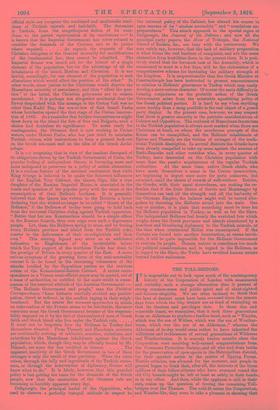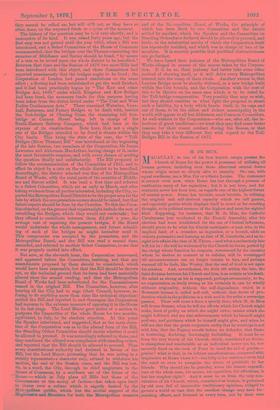THE TOLL-BRIDGES.
IT is impossible not to look upon much of the contemporary history of the Corporation of London with amazement and curiosity, such a strange alternation does it present of strong common-sense and public spirit and of short-sighted and fatuous stupidity. We are often inclined to think that the laws of descent must have been reversed since the remote days from which the City orators are so fond of reminding us that its charters and privileges date. In those dim and venerable times, we remember, that it took three generations from an Alderman to produce a feather-head, such as " Wamba, which was the son of Witless, which was the son of Weather- brain, which was the son of an Alderman ;" whereas the Alderman of to-day would seem rather to have inherited the wilfulness and recklessness of several generations of Witlesses and Weatherbrains. It is scarcely twelve months since the Corporation were receiving well-earned congratulations from the Commons Protection Society, and all who had done battle for the preservation of open spaces in the Metropolitan district, for their spirited action in the matter of Epping Forest. Hostile criticism was silenced for the moment, and people in general began to think that, after all, the interests of the three millions of their fellow-citizens who have swarmed round the old City bounds might be left at least as safely in their bands as in any other. And then, while the applause is still in their ears, comes up the question of freeing the remaining Toll- bridges over the Thames. The cold fit seizes the Corporation, and Wamba-like, they seem to take a pleasure in showing that they cannot be relied on, but will still act, as they have so often done, on the wayward freak or caprice of the moment. The history of the question may be told very shortly, and is instructive of its kind. It was raised forty years ago, but the first step was not gained until the year 1855, when a Bill was introduced, and a Select' Committee of the House of Commons recommended, that the bridges over the Thames connecting the counties of Middlesex and Surrey should be freed, " by means of a rate to be levied upon the whole district to be benefited." Between that time and the Session of 1876 two more Bills had been introduced with this object, and three Committees had reported unanimously that the bridges ought to be freed ; the Corporation of London had passed resolutions to the same effect ; a Society had been established to get the work finished, and it had been practically begun by " The Kew and other Bridges Act, 1869," under which Kingston and Kew Bridges had been freed, the necessary funds for this purpose having been taken from the duties levied under " The Coal and Wine Duties Continuance Acts." There remained Waterloo, Vaux- hall, Battersea, and Putney Bridges to be dealt with, besides the foot-bridge at Charing Cross, the remaining toll foot- bridge at Cannon Street being left in charge of the South-Eastern Railway Company, which had been at the expense of- its construction. Note here, that not a single one of the Bridges intended to be freed is situate within the City limits. This being the state of the case, the " Toll- Bridges (River Thames) Bill " was introduced at the beginning of the late Session, two members of the Corporation, Sir James Lawrence and Alderman MacArthur, having charge of it, under the most favourable auspices, and with every chance of settling the question finally and satisfactorily. The Bill proposed to follow the recommendation of the Committee of 1855, and to effect its object by a rate on the whole district to be benefited. Accordingly, the district selected was that of the Metropolitan Board of Works, with the rural parts of the counties of Middle- sex and Surrey added. It was read a first time and referred to a Select Committee, which sat as early as March, and after taking evidence from all parties interested, including the City, re- ported the Metropolitan Board District to be the proper area for the rate by which the compensation-money should be raised, but that future repairs should be done by the Counties. To this the Coun- ties objected, on the ground that repairs might include the cost of rebuilding the Bridges, which they would not undertake ; but they offered to contribute between them £2,400 a year, the average cost of repairing the present bridges, if the Board would undertake the whole management, and future rebuild- ing of such of the bridges as might hereafter need it. This compromise was accepted by the promoters, and the Metropolitan Board, and the Bill was read a second time, amended, and referred to another Select Committee, to see that it was properly carried into effect.
But now, at the eleventh hour, the Corporation intervened, and appeared before the Committee, insisting, not that any amendments proposed by them should be considered, which would have been reasonable, but that the Bill should be thrown out, on the technical ground that its form had been materially altered since the second reading, and that the Metropolitan Board of Works had been substituted for the Commissioners named in the original Bill. The Committee, however, after hearing all the City had to urge (their Council, however, re- fusing to do anything more than raise the technical objection) settled the Bill, and reported it, and thereupon the Corporation had recourse to the extreme measure of opposing it in the House in its last stage. The Lord Mayor gave notice of a motion to postpone the Committee of the whole House for two months, equivalent, in July, to its absolute rejection. At this point the Speaker intervened, and suggested, that as the main objec- tion of the Corporation was as to the altered form of the Bill, the Standing Orders Committee should decide whether it could be allowed to proceed. It was accordingly referred to them, and they condoned the alleged non-compliance with standing orders, and reported that the Bill should be allowed to proceed. Thus every constitutional authority had declared in favour of the Bill, but the Lord Mayor, protesting that he was acting in a strictly representative character only, refused to withdraw his motion, the end of the Session came, and the Bill was lost. So, in a word, the City, through its Chief magistrate in the House of Commons, by a stubborn use of the forms of the '-"House — which in July place all Bills but those of the Government at the mercy of faction—has taken upon itself to throw over a reform which is eagerly desired by the Metropolitan public, which has the cordial support of the Magistrates and Members for both the Metropolitan counties and of the Metropolitan Board of Works, the principle of which has been fixed by one Committee and the details settled by another, which the Speaker and the Committee on Standing Orders have declared should be allowed to proceed, and lastly, to the substantial merits of which the Corporation itself has repeatedly testified, and which was in charge of two of its members. It is scarcely possible that purblind obstructiveness can go further.
We have heard their jealousy of the Metropolitan Board of Works alleged in excuse of the course taken by the Corpora- tion. If it be so, their jealousy had better take some other method of showing itself, or it will drive every Metropolitan interest into the camp of their rivals. Another excuse is, that London Bridge must be shortly widened, or a new bridge built within the City bounds, and the Corporation wish the cost of this to be thrown on the same area which is to be rated for the Toll-bridge compensation. Very possibly they may so wish, but they should consider in what light the proposal to shunt such a liability, by a body which boasts itself, in its cups and out of them, to be the oldest and richest municipality in the world, will appear to all but Aldermen and Common Councillors. As well-wishers to the Corporation—who are, after all, the in- heritors of great traditions—we trust they may find some better reasons for their recent conduct during the Recess, or that they may take a very different line with regard to the Toll- Bridges Bill in the Session of 1877.



































 Previous page
Previous page